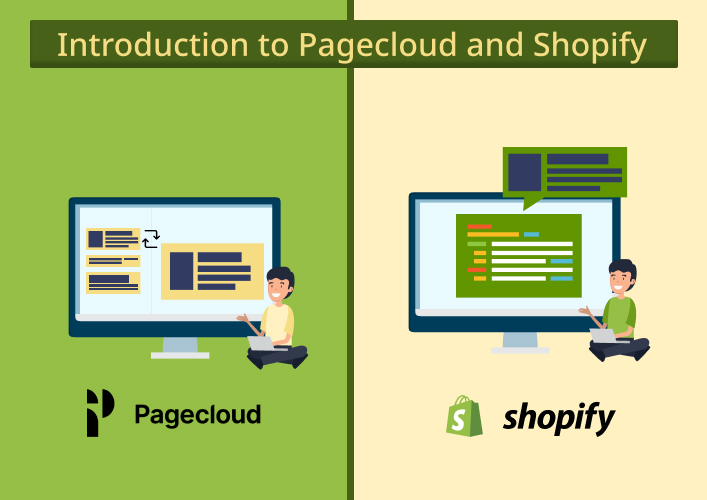Introduction to Pagecloud and Shopify

With Pagecloud, you can create professional-looking websites without having to learn complicated programming languages like HTML or CSS. You may sell items and services online, keep tabs on inventory, and stay in touch with customers by linking your site to all of your social media accounts. Let’s dissect the two options and see which one best fits your needs.
Pros and Cons of Pagecloud and Shopify
Shopify has numerous online shopping choices and is a dynamic and expandable website creator. It has a convenient interface. Furthermore, numerous adapters and extensions are available. It offers marketing via several channels. Additionally, numerous theme and personalization choices are available. It offers various sales tools and has built-in analytics and reporting. The only problem is that it is expensive and sometimes it becomes difficult to change templates.
Pagecloud on the other hand has a plethora of well-crafted layouts and a beginner-friendly interface It has straightforward and reasonable pricing and has many ways to personalize it Additionally, it offers several retail and web-based purchasing choices. But, the problem here is that larger sites can’t scale as well. Mobile-friendliness of templates varies widely and for certain add-ons, you’ll need an external account.
Pagecloud and Shopify – Features
Both seem to be quite comparable, with the same goal of making it easier to have a strong presence on the web. Online sales are supported by both platforms. Additionally, both are equipped with simple, code-free tools for creating a professional website.
Both come equipped with a wide variety of premade layouts, color schemes, and other graphical components with which you can get started making your website. Furthermore, they provide industry-specific templates and editable wireframes. You have the option of starting from scratch if you like a really unique website.
Pagecloud supports over 40 different channels for receiving payments, including widely used methods like Visa, Apple Pay, and American Express. Shopify accepts more than a hundred different payment methods, and with its own payment service – Shopify Payments you never have to pay transaction costs.
Both platforms include a drag-and-drop website builder, allowing you to effortlessly alter the look of your website to meet your individual demands. If you want to develop a one-of-a-kind shopping experience, however, Shopify is the only platform that also provides headless commerce choices with Shopify Plus.
They are both good options if you need some simple tools for handling your inventory. They have reporting and analytics options, but Shopify’s integrations with analytical tools will provide you with the deepest and most actionable information. The built-in reporting features of Shopify are more robust.
Pagecloud and Shopify – Pricing
Although there are other factors to consider, every company owner has a budget that must be taken into account when searching for the best site-building option.
Shopify offers three different plans. Full access to the Shopify site-building service, 2 staff accounts, 4 locations, and Shopify POS are all included in the $29/month basic Shopify plan. All of Basic’s capabilities, plus slightly cheaper transaction costs (2.6% + 30c online or 2.5% + 0c offline) are included in the Shopify plan. You can upgrade to Advanced Shopify and take advantage of cheaper transaction rates (2.4% + 30c online, or 2.4% + 0c in person) and all of Shopify’s other features. In addition, you may manage up to 8 warehouses’ worth of stock and fifteen different employees’ logins.
For only $20 a month, you can have your very own unique domain, 2 team members, a free Google workspace, and 1,000 monthly form submissions all on Pagecloud. You can add support for up to 10 employees, 200 pages per site, and 5,000 monthly form submissions with the business plan. The Pro plan includes 1 terabyte of monthly bandwidth, professional chat assistance, and site migration services.
Conclusion
There are many ecommerce platforms available for modern company owners. Furthermore, you won’t need a technical background to use them. Thus, anybody may start selling or communicating online right away. In conclusion, Shopify offers a plethora of benefits including improved sales tools, payment processing, and shop management. To help you take your shop to the next level, it also features a plethora of third-party apps. Therefore, Shopify seems to be the greatest choice for an advanced and scalable online store.
FAQs
What is Pagecloud?
What are the key differences between Pagecloud and Shopify?
Who should choose Pagecloud?
Who should choose Shopify?
Can I sell products on Pagecloud?
Ravi Bhojani is the Chief Marketing Officer (CMO) at Alian Software, where he spearheads the company’s marketing strategies and drives its brand presence in the competitive IT services landscape. With over a decade of experience in the technology and marketing sectors, Ravi has consistently demonstrated his ability to blend innovative marketing techniques with deep industry knowledge to deliver outstanding results.